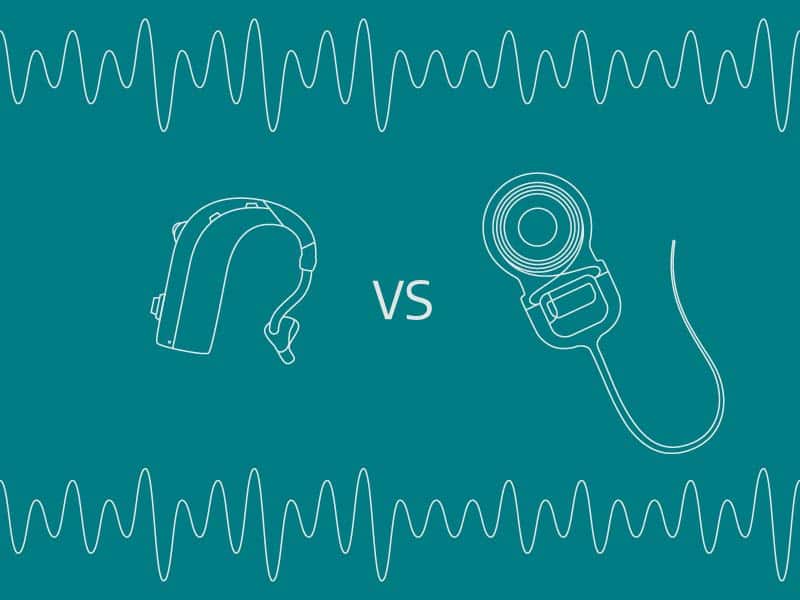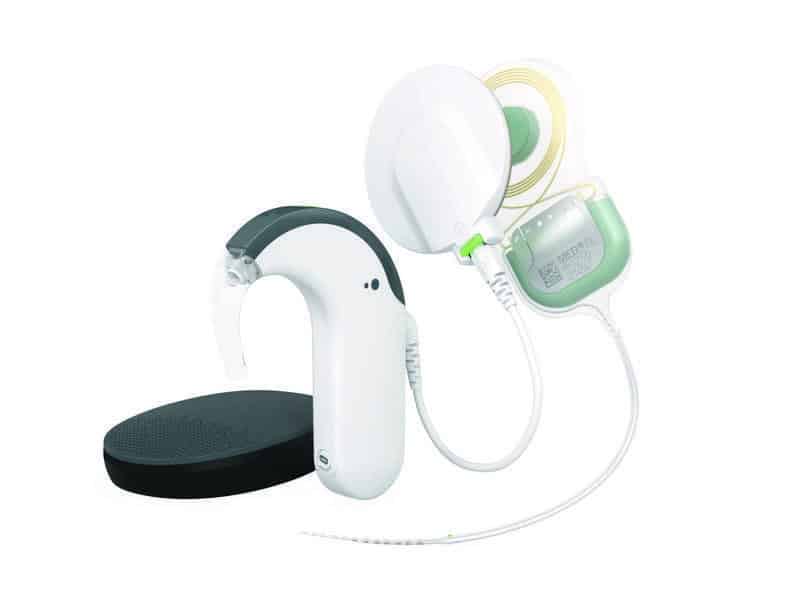
MED-EL
Published Aug 09, 2023 | Last Update Mar 07, 2024
Hearing Aids vs. Cochlear Implants: What’s the Difference?
Hearing aids and cochlear implants are both solutions for hearing loss. But there are some important differences, from how they work to what level of hearing loss they treat. In this article, we’ll take a closer look at both types of devices.

The History of Hearing Aids and Cochlear Implants
Cochlear implant technology is more complicated than hearing aid technology. But hearing aid technology has been around for longer. The first electric hearing aid was created at the end of the 19th century. But cochlear implants are a relatively new technology—the world’s first modern cochlear implant was implanted in Vienna in 1977.
Since then, CI technology has improved in leaps and bounds. The first cochlear implants had bulky audio processors. They were clipped onto clothing and looked a bit like portable cassette tape players. Now you can wear them behind your ear like some hearing aids or even as a single-unit processor directly on your head.
Amplification vs. Electric Stimulation: How Hearing Aids and Cochlear Implants Work
If you have mild-to-moderate hearing loss, a hearing aid makes sounds louder so you can hear them. These amplified sounds pass through the middle ear, on to the inner ear, and then to the brain.
If you have severe-to-profound hearing loss, a cochlear implant may help you. If you have this type of hearing loss, the hair cells in your inner ear—also known as the cochlea—may be damaged. Since the inner ear is unable to perceive even the loudest sounds, a cochlear implant stimulates the inner ear directly.
An external audio processor sends sound signals to the electrode array. The electrode array is part of the internal implant which contains a magnet. This magnet holds the audio processor in place through the skin. Electric stimulation mimics the way the inner ear would transmit sound information to the brain.

Different Devices, Different Designs
Hearing aids come in many shapes and sizes. But because the technology contained within them is less complex, modern hearing aids are smaller than cochlear implant systems. You can wear a hearing aid behind your ear, in your ear but partially visible, or almost completely hidden in your ear canal. Cochlear implant audio processors are either worn behind the ear or completely off the ear.
The audio processor part of a cochlear implant system is also an external device. But the implant itself requires surgery to place it under the skin and insert it into the inner ear. That means cochlear implants are medical devices. So they are regulated much more strictly than hearing aids. There are strict quality assurance procedures in place along every step of the manufacturing process to ensure top reliability and safety for recipients.
What Makes Hearing Different?
Annoying feedback caused by how hearing aids amplify sound can be an issue for hearing aid users. Because cochlear implants send signals directly to the inner ear rather than amplifying sound, feedback is not a problem.
Cochlear implants and hearing aids also differ when it comes to rehabilitation. Hearing aid users may need to spend a little bit of time getting used to their new hearing devices and learning how to use them. CI rehabilitation, however, is more complicated. Because having a CI means hearing in a new way—or hearing for the first time ever—your brain must learn how to process and interpret these new signals. Targeted rehabilitation sessions and practice at home can speed this process along.
Bimodal Hearing: The Best of Both Technologies
Not all people have the same level of hearing loss in both ears. In addition to being a solution for bilateral hearing loss or single-sided deafness (SSD), cochlear implants can also be used for bimodal hearing. That means you can have a CI for the ear with more severe hearing loss and a hearing aid for the ear with less severe hearing loss.
But won’t things sound strange with two different hearing technologies? Bimodal user Dr. Jason’s experience makes it clear how far cochlear implant technology has come when he says:
“My implant sounds very natural. There were some sounds that took longer than others, but the sound quality is nearly the same whether I have my hearing aid in the other ear or not.”
MED-EL cochlear implants are compatible with all brands of hearing aids. Cochlear implants transmit sound almost instantaneously to the brain. But hearing aids take slightly longer to amplify sound. To eliminate this slight delay, your MED-EL cochlear implant can be programmed to offset this no matter what hearing aid you have.
Get in Touch With an Expert
Think you might be a candidate for a cochlear implant? Our hearing experts are ready to guide you through the next steps. Simply visit the clinic finder to find a hearing expert near you.
Find a ClinicReferences

MED-EL
Was this article helpful?
Thanks for your feedback.
Sign up for newsletter below for more.
Thanks for your feedback.
Please leave your message below.
Thanks for your message. We will reply as soon as possible.
Send us a message
Field is required
John Doe
Field is required
name@mail.com
Field is required
What do you think?
© 2023 MED-EL Medical Electronics. Alle Rechte vorbehalten. Der Inhalt dieser Webseite dient nur zur allgemeinen Information. Es werden keine medizinischen Ratschläge gegeben. Kontaktieren Sie bitte Ihren Arzt oder Hörspezialisten und lassen Sie sich dort beraten, welche Hörlösung in Ihrem Fall geeignet ist. Nicht alle der gezeigten Produkte, Produktfunktionen oder Indikationen sind in allen Ländern zugelassen bzw. verfügbar.
Rohini Haldankar
August 27, 2023
Very nice article.To the point. I am a lecturer in rehabilitation diploma courses. In audiology paper this is important question.
baranagarspeechandhearing
November 16, 2023
Fantastic post! I never thought in that way before. You've broadened my understanding. Visit us: https://www.baranagarspeechandhearing.com/
Pearl Tree
November 19, 2024
What happens if you tinnitus?
MED-EL
November 20, 2024
Pearl, thank you for your question. You may be interested in reading more about one users journey with cochlear implants and tinnitus here: https://blog.medel.com/userstories/cochlear-implants-for-tinnitus-hyperacusis/ Kind Regards

MED-EL

MED-EL



Conversation
3 Comments